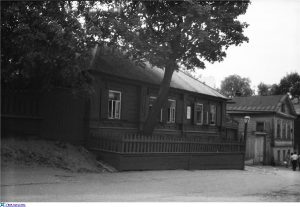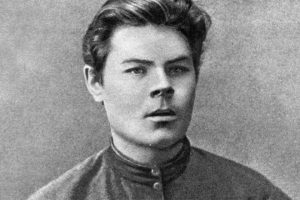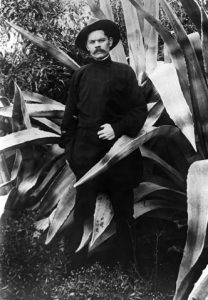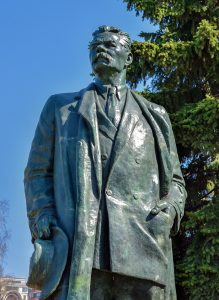Биография Максима Горького на английском языке
Здесь вы можете прочитать биографию Максима Горького на английском языке.

Maxim Gorky worked as a pressman for different provincial newspapers and his pseudonym was Jehudiel Khlamida. From 1892 Alexei Peshkov started to use the pseudonym Gorky. At that time he worked in Tiflis for the newspaper The Caucasus. His first book “Essays and Stories” was completed in 1898 and this work was a great success. This was the beginning of his literary career. In his works Gorky described the problems, humiliations and relations among people in the lowest strata and on the margins of society.
Gorky had a good reputation and he supported the nascent Marxist social-democratic movement. As a result both a large number of “conscious” workers and intelligentsia appreciated him and Gorky became famous.
Maxim Gorky openly disapproved the Tsarist regime and was imprisoned many times. He supported a lot of revolutionists. In 1902 Gorky became acquainted with Lenin and after a while made friends with him. The same year he was elected an honorary Academician of Literature but Tsar Nicholas II annulled this title. Vladimir Korolenko and Anton Chekhov made a remonstrate against that decision and left the Academy.
In 1904 Maxim Gorky arrived in Nizhny Novgorod and tried to establish a theatre. Savva Morozov and Constantin Stanislavski supported him but the censorship banned all the plays and Gorky gave up his idea. Afterwards he began to give financial support to the Russian Social Democratic Labour Party. Between 1906 and 1913 Gorky spent time on the island of Capri because of problems with health and the repressive situation in Russia. In 1913 Gorky arrived in Russia and continued his work. Throughout the revolutionary period of 1917 Gorky’s politics was close to the Bolsheviks.
In 1921 Moura Budberg was employed by Gorky as a secretary. Afterwards she became his unofficial wife. The same year his friend Nikolay Gumilev was imprisoned and Gorky arrived in Moscow to release him from Lenin. When Gorky arrived Gumilev had already been killed. Two months later he went to Italy for health reason: he had tuberculosis.
According to Alexander Solzhenitsyn, Maxim Gorky returned to the USSR because of financial difficulties. While in Sorrento Gorky had no money. In 1932 he returned to the Soviet Union. His return from Fascist Italy was a major propaganda victory for the Soviets. Consequently Gorky was awarded with the Order of Lenin and given a detached house and a cottage in the country. In addition to that the city of his birth was renamed in his honour.
In May 1934 his son Maxim Peshkov suddenly died. In June 1936 Maxim Gorky died. There are a lot of suppositions connected with the circumstances of his death. It is known that Stalin was among the people who carried the coffin of Gorky during the funeral.
Gorky Maxim – Максим Горький
Maxim Gorky whose real name was Aleksei Maximovich Peshkov, was born on March 16, 1868, in the Volga River city of Nizhny Novgorod, which in 1932 was renamed Gorky in his honor. His father, a cabinetmaker, died when Gorky was 4 years old, and the boy was raised in harsh circumstances by his maternal grandparents, the proprietors of a dye works.
From the age of 10 Gorky was virtually on his own, and he worked at a great variety of occupations, among them shopkeeper’s errand boy, dishwasher on a Volga steamer, and apprentice to an icon maker. At a very tender age he saw a great deal of the brutal, seamy side of life and stored up impressions and details for the earthy and starkly realistic stories, novels, plays, and memoirs which he later wrote.
Almost completely self-educated, at the age of 16 Gorky tried without success to enter the University of Kazan. For the next 6 years he wandered widely about Russia, the Ukraine, and the Caucasus. In 1888 he worked in fisheries on the Caspian Sea. Gradually he developed revolutionary sympathies; he was arrested for antigovernmental activities for the first time in 1889 and from then on was closely watched by the police. In 1891-1892 he spent a year in Tiflis, where he worked in railroad workshops, and where his first published short story, “Makar Chudra,” appeared in a newspaper in 1892.
From then on Gorky devoted himself mainly to literature, and in the next 5 years his stories appeared chiefly in newspapers along the Volga. His first collection of stories, published in 1898, made him famous throughout Russia, and his fame spread rapidly to the outside world. These early stories featured tramps, vagabonds, derelicts, and social outcasts. Gorky portrayed the bitterness of the oppressed and exploited people of Russia and demonstrated a proud defiance against organized, respectable society. He often found strong elements of humanity and individual dignity in even the most brutalized and demoralized of these “down-and-outers.” His sympathy for the underdog made him known as a powerful spokesman for the illiterate masses—their sufferings and their dreams of a better life.
Foma Gordeyev (1899) established Gorky as a major novelist. It is the story of a well-intentioned but weak man who feels disgust, boredom, and guilt as the inheritor of a profitable family business. He rebels against his family and his class, but he is lacking in moral fiber, and in the end the forces of tradition defeat and destroy him. In this novel and all his later works, Gorky identified himself as being a bitter enemy of capitalism and depicted the society of prerevolutionary Russia as drab and dreary.
During this same period Gorky began writing plays and formed close connections with the Moscow Art Theater, which in 1902 produced his most famous play, The Lower Depths. It shows the misery and utter hopelessness of the lives of people at the bottom of Russian society and at the same time examines the illusions by means of which many of the unfortunate people of this earth sustain themselves.
Tall and rawboned, Gorky affected coarse dress and often crude manners at this stage of his life, but his personality was colorful and attractive. Even as a young man, he made many influential friends, including the two most famous writers of the day, Leo Tolstoy and Anton Chekhov. His memoirs of these two men, written many years later, are among his finest works.
Gorky became increasingly active in the revolutionary movement. He was arrested briefly in 1898, and in 1901 he was exiled to the provinces for having helped organize an underground press. When he was elected to the Russian Academy of Sciences in 1902, the Czar vetoed the appointment because of the author’s subversive activities. During the 1905 Revolution, Gorky was again imprisoned for writing proclamations calling for the overthrow of the Czar’s government.
In 1906 Gorky left Russia illegally and went to America to raise funds for his fellow revolutionists and spent most of the year there, where he wrote the novel Mother. This is a propaganda novel which tells of how a simple working-class woman, inspired by the example of her son, who is a militant revolutionist, herself becomes an activist in the class struggle. Mother was regarded in the Soviet Union as a classic of “socialist realism.”
From 1906 to 1913 Gorky lived in Italy on the island of Capri, where his home became a center of literary and political activity among Russians abroad. In 1913 he received an amnesty from the Czar’s government and returned to Russia. In the next 3 years he completed the first two volumes of his autobiography, Childhood (1913) and My Apprenticeship (1915). (The third volume, My Universities, was published in 1922.) Gorky’s autobiography is his finest work, describing dramatically and colorfully the people he knew and the adventures he had from boyhood to young manhood. It paints a fascinating picture of the Russia of his times. In many respects Gorky’s nonfictional works are superior to his fiction.
In the years immediately following the October Revolution of 1917, Gorky worked tirelessly to help preserve the Russian cultural heritage. He organized homes for writers and artists, founded publishing houses and theaters, and used his influence with the new Soviet regime to encourage the development of the arts. He spent most of the period from 1921 to 1933, however, in Germany and Italy, partly for treatment of a lung ailment and partly because of disagreement with policies of the Soviet government. During this period he wrote the large novels The Artamonov Business (1925) and The Life of Klim Samgin (an epic novel translated into English as four separate novels—The Bystander, The Magnet, Other Fires, and The Specter), all of them severely critical of life in prerevolutionary Russia. These novels are long and slow-moving, and many readers find them dull and ponderous.
In the late 1920s and early 1930s Gorky made several trips to the Soviet Union, and he returned to stay in 1933. Once again he was very active on the cultural scene, chiefly in book and magazine publishing and literary criticism.
Gorky died near Moscow in 1936. Even in his lifetime he had been enormously celebrated in his native land. Since his death he has been officially hallowed as the greatest Russian writer of the 20th century, and numerous theaters, museums, streets, universities, and even factories and collective farms were named after him.
Maxim Gorky
Our editors will review what you’ve submitted and determine whether to revise the article.
Maxim Gorky, also spelled Maksim Gorky, pseudonym of Aleksey Maksimovich Peshkov, (born March 16 [March 28, New Style], 1868, Nizhny Novgorod, Russia—died June 14, 1936), Russian short-story writer and novelist who first attracted attention with his naturalistic and sympathetic stories of tramps and social outcasts and later wrote other stories, novels, and plays, including his famous The Lower Depths.
Early life
Gorky’s earliest years were spent in Astrakhan, where his father, a former upholsterer, became a shipping agent. When the boy was five his father died; Gorky returned to Nizhny Novgorod to live with his maternal grandparents, who brought him up after his mother remarried. The grandfather was a dyer whose business deteriorated and who treated Gorky harshly. From his grandmother he received most of what little kindness he experienced as a child.
Gorky knew the Russian working-class background intimately, for his grandfather afforded him only a few months of formal schooling, sending him out into the world to earn his living at the age of eight. His jobs included, among many others, work as assistant in a shoemaker’s shop, as errand boy for an icon painter, and as dishwasher on a Volga steamer, where the cook introduced him to reading—soon to become his main passion in life. Frequently beaten by his employers, nearly always hungry and ill clothed, he came to know the seamy side of Russian life as few other Russian authors before or since. The bitterness of these early experiences later led him to choose the word gorky (“bitter”) as his pseudonym.
His late adolescence and early manhood were spent in Kazan, where he worked as a baker, docker, and night watchman. There he first learned about Russian revolutionary ideas from representatives of the Populist movement, whose tendency to idealize the Russian peasant he later rejected. Oppressed by the misery of his surroundings, he attempted suicide by shooting himself. Leaving Kazan at the age of 21, he became a tramp, doing odd jobs of all kinds during extensive wanderings through southern Russia.
First stories
In Tbilisi (Tiflis) Gorky began to publish stories in the provincial press, of which the first was “Makar Chudra” (1892), followed by a series of similar wild Romantic legends and allegories of only documentary interest. But with the publication of “ Chelkash” (1895) in a leading St. Petersburg journal, he began a success story as spectacular as any in the history of Russian literature. “Chelkash,” one of his outstanding works, is the story of a colourful harbour thief in which elements of Romanticism and realism are mingled. It began Gorky’s celebrated “tramp period,” during which he described the social dregs of Russia. He expressed sympathy and self-identification with the strength and determination of the individual hobo or criminal, characters previously described more objectively. “ Dvadtsat shest i odna” (1899; “Twenty-Six Men and a Girl”), describing the sweated labour conditions in a bakery, is often regarded as his best short story. So great was the success of these works that Gorky’s reputation quickly soared, and he began to be spoken of almost as an equal of Leo Tolstoy and Anton Chekhov.
Plays and novels
Next Gorky wrote a series of plays and novels, all less excellent than his best earlier stories. The first novel, Foma Gordeyev (1899), illustrates his admiration for strength of body and will in the masterful barge owner and rising capitalist Ignat Gordeyev, who is contrasted with his relatively feeble and intellectual son Foma, a “seeker after the meaning of life,” as are many of Gorky’s other characters. From this point, the rise of Russian capitalism became one of Gorky’s main fictional interests. Other novels of the period are Troye (1900; Three of Them), Ispoved (1908; A Confession), Gorodok Okurov (1909; “Okurov City”), and Zhizn Matveya Kozhemyakina (1910; “The Life of Matvey Kozhemyakin”). These are all to some extent failures because of Gorky’s inability to sustain a powerful narrative, and also because of a tendency to overload his work with irrelevant discussions about the meaning of life. Mat (1906; Mother) is probably the least successful of the novels, yet it has considerable interest as Gorky’s only long work devoted to the Russian revolutionary movement. It was made into a notable silent film by Vsevolod Pudovkin (1926) and dramatized by Bertolt Brecht in Die Mutter (1930–31). Gorky also wrote a series of plays, the most famous of which is Na dne (1902; The Lower Depths). A dramatic rendering of the kind of flophouse character that Gorky had already used so extensively in his stories, it still enjoys great success abroad and in Russia. He also wrote Meshchane (1902; The Petty Bourgeois, or The Smug Citizen), a play that glorifies the hero-intellectual who has revolutionary tendencies but also that explores the disruptions revolutionaries can wreak on everyday life.
Презентация по английскому языку на тему «Жизнь и творчество Максима Горького»
специалист в области арт-терапии
Описание презентации по отдельным слайдам:
Авторы: Храмова Кристина Тимачева Анжела Руководитель: Столетова Н.К. Муниципальное общеобразовательное учреждение Хохломская средняя школа Районная конференция по регионоведению на английском языке «Моя книга о Нижнем Новгороде и Нижегородском крае» Хохлома, 2018
Our book «Maxim Gorky’s life» It is dedicated to the 150th anniversary of the birth of Maxim Gorky
Our motto: Believe in yourself and go ahead
Maxim Gorky is an outstanding Russian writer. His works are famous all over the world.
We are proud that he was born in our native city Nizhny Novgorod. He was born on the 18th of March 1868 (150 years ago). His real name was Aleksey Peshkov but he is better known by his professional name Maxim Gorky.
He is best known for his novels «Foma Gordeev», «Mother», «My childhood» and others. In his poems he described with love and understanding the simple life he knew.
Maxim Gorky spent 25 years of his life in Nizhny Novgorod.
He was the fourth child in the family of Maxim Peshkov and Varvara Peshkova and the luckiest one. His two sisters and brothers died.
His life was a hard one Alyosha’s father called Maxim Peshkov died of cholera when the writer was only 3 years old.
He and his mother Varvara Peshkova left Astrakhan for Nizhny Novgorod they lived in the house of his grandfather Vasily Kashirin. The atmosphere in the family was not friendly. Arguments, quarrels and even fights were common in the family. This produced an unforgettable impression on Alex. He described those days in his novel «My childhood».
Speaking about his childhood we should not omit mentioning that he was greatly loved by his grandmother Akylina Ivanova a good hearted woman. She taught him to love and understand people.
Maxim Gorky was thought by mother and grandfather how to read and write. He was crazy about reading Alyosha took classes at the Kunavinskoye Primary School for two years only. He was an excellent student at school but had to leave it. His mother died when he was nine years old and he had to start working. He worked as a gardener, a washer at the ship, a trader and etc. Alyosha never finished even elementary school and got his education mainly from his observations of people while travelling along Russia.
In August of 1896 at the age of 28 he married E.P. Volzhina a well-read and well-educated woman. She was his secretary later. They had got 2 children. Maxim and Kate. Kate died at the age of 5 in August 1906 and the son Maxim died at the age of 37 in 1934.
Gorky led the life of action and had a lot of friends among thew were writers Anton Chekhov and Vladimir Korolenko, a singer Fyodor Chaliapin and a politician Vladimir Lenin.
He was fully engaged in social, cultural and educational activities. For his ideas Gorky was arrested and sent to the Nizhny Novgorod jail several times. To avoid repressions the writer and his common law wife Maria Andreyeva an actress of the Moscow Art theater left Russia for America.
On June 18, 1936 Gorky died at his dacha in the village of Gorki (Moscow Region) at the age of 68. The urn with the ashes of the writer is immured in the Kremlin wall on the Red Square in Moscow. To commemorate Maxim Gorky from 1932 to 1990 Nizhny Novgorod was known as Gorky. Gorky is famous not only in Russia, but globally.
Номер материала: ДБ-306094
Не нашли то что искали?
Вам будут интересны эти курсы:
Оставьте свой комментарий
Подарочные сертификаты
Низкие способности к самостоятельному выполнению заданий приводят к трудностям в обучении
Время чтения: 3 минуты
Минпросвещения готовит программу модернизации педагогических вузов
Время чтения: 1 минута
Правительство РФ проработает вопрос обеспечения детей молоком в школах
Время чтения: 1 минута
Минздрав разрешит исследования «Спутника V» на детях с 12 лет
Время чтения: 1 минута
Аккредитация российских вузов станет бессрочной с 1 марта 2022 года
Время чтения: 2 минуты
В российских вузах начнут готовить новых специалистов в области климата
Время чтения: 1 минута
Ответственность за разрешение любых спорных моментов, касающихся самих материалов и их содержания, берут на себя пользователи, разместившие материал на сайте. Однако администрация сайта готова оказать всяческую поддержку в решении любых вопросов, связанных с работой и содержанием сайта. Если Вы заметили, что на данном сайте незаконно используются материалы, сообщите об этом администрации сайта через форму обратной связи.
Все материалы, размещенные на сайте, созданы авторами сайта либо размещены пользователями сайта и представлены на сайте исключительно для ознакомления. Авторские права на материалы принадлежат их законным авторам. Частичное или полное копирование материалов сайта без письменного разрешения администрации сайта запрещено! Мнение администрации может не совпадать с точкой зрения авторов.
Максим Горький
краткая биография
 Роль и место в литературе
Роль и место в литературе
Максим Горький – яркий представитель русской литературы конца XIX – начала XX столетия, который известен произведениями революционной тематики. Он стал основоположником социалистического реализма. Был номинирован на Нобелевскую премию.
Происхождение и ранние годы
Максим Горький – это творческое имя писателя, а настоящее имя – Алексей Максимович Пешков. Он родился в 1868 году в России (Нижний Новгород).
Дом деда Горького Каширина
Отец – Максим Савватьевич Пешков, столяр. Когда будущему писателю было три года, он заболел холерой. Отец ухаживал за ним, и в результате тоже заразился. Мальчик выжил, а Максима Пешкова не стало. Есть версия, что писатель взял псевдоним Максим Горький, чтобы сохранить память о родителе.
Мать — Варвара Васильевна Пешкова (в девичестве Каширина). Она была родом из мещан. В 1879 году заболела чахоткой с летальным исходом.
Так как родителей Горького рано не стало, его воспитанием занимались бабушка и дедушка. Детство он провел в доме деда, Василия Каширина. С ранних лет мальчик полюбил народное творчество благодаря бабушке, которая стала первым его проводником в мир литературы. Потом Горький будет вспоминать о ней с нежностью, говоря, что «был наполнен ее стихами, как улей медом».
Образование
Первым учителем Горького стала мать, которая научила его читать. Дедушка обучил мальчика азам церковной грамоты. Алексей ходил в приходскую школу, но ушел из нее из-за болезни. Потом закончил два класса в слободском начальном училище. Там у него не складывались отношения с учителями. И только одного человека он уважал – епископа. Так же некоторое время посещал начальное приходское училище для бедных. Непростой характер и бедность стали причинами, по которым будущий писатель не получил даже среднего образования. Однако Алексей имел отличную память и много читал, так что скоро мог цитировать классиков. В 1884 году он пробовал поступить в Казанский университет, но не прошел отбор. Не получив хорошего образования, Горький заменил его самообразованием, хотя всю жизнь писал с орфографическими ошибками.
Творчество
Максим Горький был непростой личностью, по его словам, он был рожден, чтобы не соглашаться. Он много путешествовал по стране — и увиденное подтолкнуло его к идее пропаганды революции. За это Горький был даже арестован.
В 1892 году напечатали рассказ Горького «Макар Чудра». Это было первым шагом к литературной известности. А в 1898 году вышли два тома «Очерки и рассказы», которые принесли ему славу.
В 1902 году писатель был удостоен звания члена Императорской академии наук, но Николай II приказал отменить это решение.
Кроме революционной литературы, Горький писал сказки для детей. Например: «Сказка про Иванушку-дурачка», «Воробьишко».
В 1906 году писатель вынужден эмигрировать в США, потом в Италию. Но и там Горький продолжал писать произведения на революционную тематику.
Основные произведения
Памятник писателю в Москве
Итогом первых творческих исканий Горького стал рассказ «Старуха Изергиль» (1894). Это произведение является суровой притчей о героизме и эгоизме.
В стиле натурализма написан рассказ «Супруги Орловы» (1897). Автор реалистично описал жизнь, которую многие хотели бы не знать.
В пьесе «На дне» (1901-1902) Максим Горький отобразил жизнь «дна» социума: нищих, морально падших людей. События происходят в ночлежном доме для неимущих. Писатель создал многогранную галерею образов, подчеркнув тем самым, что эта проблема затронула людей разного возраста, происхождения и морали. В 1904 году Максим Горький получил Грибоедовскую премию за эту пьесу. Но, несмотря на общественное признание, постановка произведения не была разрешена на императорской сцене, а только в МХТ.
Роман «Мать» был написан под впечатлением от событий 1905 года и стал фундаментальным для социалистического реализма.
Последние годы
После эмиграции Максим Горький возвращается на Родину только в 1932 году. Он активно занимается литературной деятельностью. Но в 1936 году его не стало при загадочных обстоятельствах.











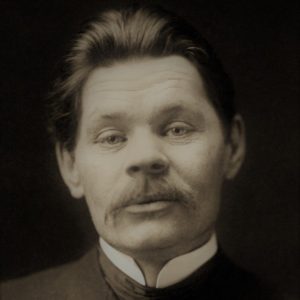 Роль и место в литературе
Роль и место в литературе